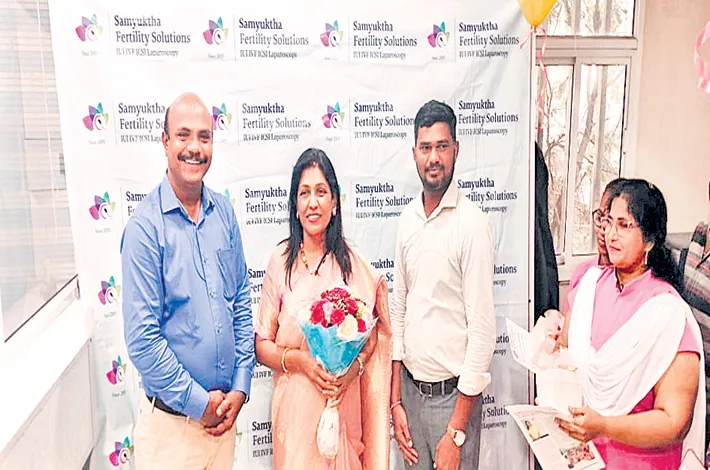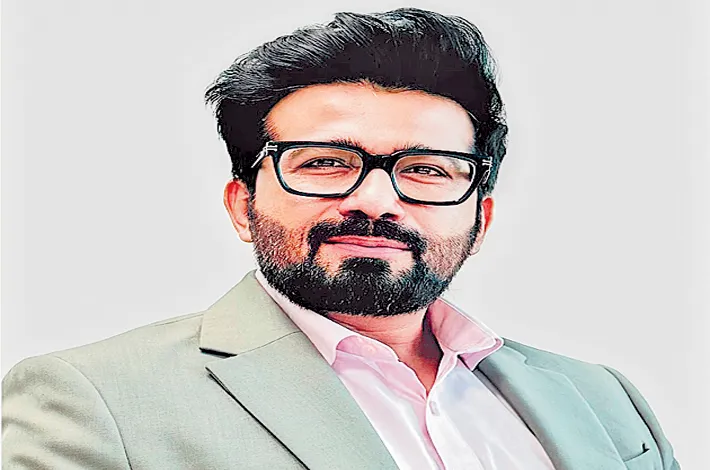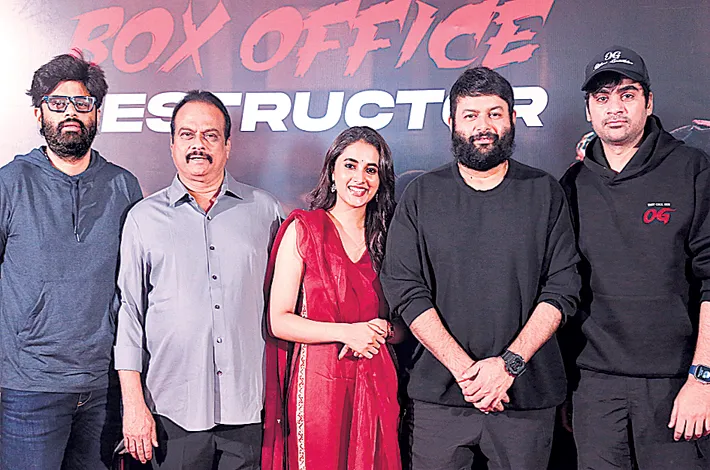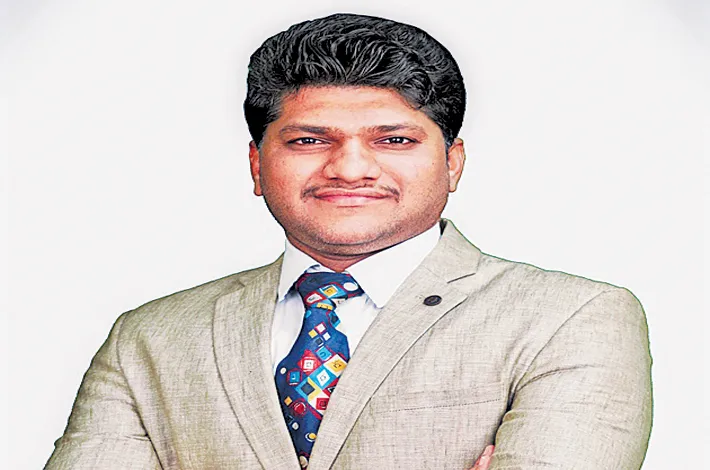Undivided Hindu family in Sitanagaram
23-09-2025 12:00:00 AM
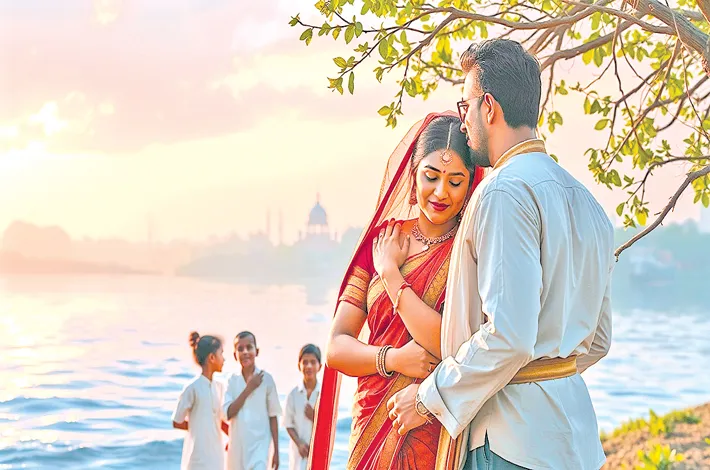
In the lush, rain-kissed valleys of Sitanagaram, where the Godavari whispered secrets to the ancient banyan trees, Ananda Nilayam stood like a sentinel of forgotten grandeur. It was here, amid the scent of jasmine and the distant rumble of monsoons, that Prasad first glimpsed the world through Padma's eyes. She was eight, he ten—cousins bound not just by blood but by the unbreakable thread of childhood wonder. Parvati, Prasad's mother, doted on her brother's three orphaned girls: Padma, the eldest with her raven hair and eyes like polished onyx; Latha, the dreamer with laughter like temple bells; and Rama, the fierce protector with a temper as quick as a summer storm.
The zamindar's palace buzzed with life under Raghupati Naidu's benevolent rule. He gave freely to the villagers—rice for the hungry, shelter for the storm-tossed—his heart as vast as the river. But Chakradhar, Parvati's husband and Prasad's father, chafed at this. "Charity should lift all, not just our shadows," he argued one evening, his voice echoing off the marble halls. The rift widened like a crack in parched earth. Pride clashed with tradition, and in a heated confrontation, tragedy struck. Raghupati collapsed, his heart giving way, and whispers flew: accident or curse?
Jagan Naidu, Padma's father, shattered by grief, pointed a trembling finger at Chakradhar. "You've poisoned our home!" The family splintered like monsoon lightning. Parvati, torn between loyalty and love, fled with her son to a modest village hut. Jagan sent his daughters to the city, to hostels where ambition replaced affection. Prasad and Padma, once inseparable, were adrift on separate currents—letters unanswered, memories fading like ink in the rain.
Years rolled like the Godavari's relentless flow. Prasad grew into a man of quiet resolve, studying law in the bustling heart of Vijayawada, his nights lit by oil lamps and dreams of a girl who once chased fireflies with him. Padma, now twenty, bloomed in the city's unforgiving glare. She worked as a teacher, her voice weaving stories for wide-eyed children, but her heart echoed hollow. Latha, ever the romantic, had fallen for Madhu, the charming son of a ruthless moneylender, Bhujangam. Their stolen glances in college corridors sparked like diyas in the dusk, but shadows loomed—Bhujangam's greed, Jagan's mounting debts.
Fate, that capricious weaver, tangled their paths again at a rain-soaked festival. Prasad, visiting his old friend Madhu, spotted a familiar silhouette under a tamarind tree. Padma, drenched and laughing with Latha and Rama, turned—and time folded. Her eyes, still holding the depth of forgotten rivers, met his. "Prasad?" she whispered, as if summoning a ghost. He nodded, throat tight, and in that moment, the years dissolved. They talked through the night, words tumbling like monsoon drops: shared sorrows, the ache of absence, the unyielding pull of what might have been.
Love reignited, fierce and forbidden. Prasad's home was a sanctuary of simple joys—Parvati's warm chapatis, stories of the stars—but Jagan's rift lingered like a curse. When Prasad confessed his heart, Parvati's face crumpled. "Your uncle's wounds run deep, beta. He sees only betrayal in our blood." Yet Padma's letters, smuggled through Madhu, carried the scent of wildflowers and promises: Meet me by the river, where the lotuses bloom.
Obstacles rose like the zamindar's crumbling walls. Jagan, hounded by Bhujangam's loans, faced ruin. His sly manager, Garataiah, pilfered jewels meant for salvation, leaving the family destitute. Latha's romance with Madhu teetered on disaster—Bhujangam schemed to wed his son to a wealthy heiress, Kondamma, whose dowry could drown a village. Latha fell ill with heartbreak, her fever a mirror to Padma's silent despair. Prasad, torn between loves, rallied his friends: Anand, the sharp-witted detective and Garataiah's son, and Madhu, whose rebellion mirrored his own.
In the dead of night, under a sky bruised with clouds, Prasad confronted Bhujangam at his opulent den. Disguised as a wandering sadhu, he haunted the moneylender's dreams, whispers of karma echoing through the halls. Anand uncovered the theft, chasing shadows to reclaim the jewels. Chaos erupted: a botched wedding, a lunatic's farce to free Madhu, gunshots in the gloom. Prasad took a grazing bullet meant for his cousin's honor, collapsing in Padma's arms as she rushed to the fray. "Don't leave me again," she sobbed, her tears mingling with rain on his cheek.
Dawn broke with revelations. At Ananda Nilayam, rebuilt not by gold but by truth, Jagan knelt before Parvati. "Forgive an old fool's pride," he murmured, eyes glistening. The jewels returned, debts absolved, Bhujangam humbled into blessing Latha and Madhu's union. And Prasad and Padma? Their hands clasped under the banyan, rings exchanged in a ceremony woven with marigolds and monsoon vows.
As the Godavari swelled with spring's promise, they stood on the riverbank, children laughing at their heels—Latha's twins, Rama's scholars. Prasad pulled Padma close, her head on his shoulder. "We were always meant to find each other," he said, voice like the river's song. She smiled, eyes reflecting the eternal flow. In Sitanagaram, love had mended what pride had torn, proving that hearts, like monsoons, always return home.





